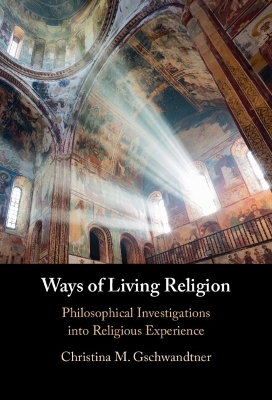
Ways of Living Religion
Philosophical Investigations into Religious Experience
Seiten
2024
Cambridge University Press (Verlag)
978-1-009-47678-2 (ISBN)
Cambridge University Press (Verlag)
978-1-009-47678-2 (ISBN)
Ways of Living Religion provides a philosophical analysis of different types of religious experience, focusing on the lived experience of religion rather than mere statements of belief or doctrine. Christina M. Gschwandtner distinguishes between experiences by examining their defining features, showing their continuity with human experience.
Ways of Living Religion provides a philosophical analysis of different types of religious experience - ascetic, liturgical, monastic, mystical, devotional, compassionate, fundamentalist - that focuses on the lived experience of religion rather than reducing it to mere statements of belief or doctrine. Using phenomenology, Christina M. Gschwandtner distinguishes between different kinds of religious experiences by examining their central characteristics and defining features, as well as showing their continuity with human experience more broadly. The book is the first philosophical examination of several of these types, thus breaking new ground in philosophical thinking about religion. It is neither a confessional treatment nor a reduction of the lived experience to psychological or sociological phenomena. While Gschwandtner's treatment focuses on Christian forms of expression of these different types, it opens the path to broader examinations of ways of living religion that might enable scholars to give a more nuanced account of their similarities and differences.
Ways of Living Religion provides a philosophical analysis of different types of religious experience - ascetic, liturgical, monastic, mystical, devotional, compassionate, fundamentalist - that focuses on the lived experience of religion rather than reducing it to mere statements of belief or doctrine. Using phenomenology, Christina M. Gschwandtner distinguishes between different kinds of religious experiences by examining their central characteristics and defining features, as well as showing their continuity with human experience more broadly. The book is the first philosophical examination of several of these types, thus breaking new ground in philosophical thinking about religion. It is neither a confessional treatment nor a reduction of the lived experience to psychological or sociological phenomena. While Gschwandtner's treatment focuses on Christian forms of expression of these different types, it opens the path to broader examinations of ways of living religion that might enable scholars to give a more nuanced account of their similarities and differences.
Christina M. Gschwandtner is Professor of Philosophy at Fordham University and author of Reading Jean-Luc Marion (2007), Postmodern Apologetics? (2012), Degrees of Givenness (2014), Marion and Theology (2016), Welcoming Finitude (2019), and Reading Religious Ritual with Ricoeur (2021), as well as many articles and translations at the intersection of phenomenology and religion.
Preface; Acknowledgments; Introduction: Phenomenology as a Method for Exploring Religious Experience; 1. Ascetic Experience; 2. Liturgical Experience; 3. Monastic Experience; 4. Mystical Experience; 5. Devotional Experience; 6. Compassionate Experience; 7. Fundamentalist Experience; Conclusion; Bibliography; Index.
| Erscheinungsdatum | 02.03.2024 |
|---|---|
| Zusatzinfo | Worked examples or Exercises |
| Verlagsort | Cambridge |
| Sprache | englisch |
| Themenwelt | Geisteswissenschaften ► Philosophie |
| Religion / Theologie ► Christentum ► Kirchengeschichte | |
| ISBN-10 | 1-009-47678-5 / 1009476785 |
| ISBN-13 | 978-1-009-47678-2 / 9781009476782 |
| Zustand | Neuware |
| Haben Sie eine Frage zum Produkt? |
Mehr entdecken
aus dem Bereich
aus dem Bereich
von Athanasius bis Gregor dem Großen
Buch | Softcover (2024)
C.H.Beck (Verlag)
12,00 €
eine Geschichte der christlichen Kunst
Buch | Hardcover (2024)
C.H.Beck (Verlag)
32,00 €


